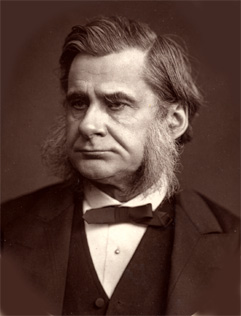Fuente: Autobiography and Selected Essays http://books.google.es/books?id=8xEoY_pWE2kC&pg=PA61. Thomas Henry Huxley. Echo Library, 2006. ISBN 1-4068-0059-7, pág. 61
Frases célebres de Thomas Henry Huxley
Fuente: "The interpreters of Genesis and the interpreters of Nature" (1885) http://aleph0.clarku.edu/huxley/CE4/GeNat.html.
“Prefiero ser el descendiente de dos simios que ser un hombre y tener miedo a enfrentar la verdad.”
Fuente: Citado en: Cyril Bibby: T.H. Huxley: Scientist, Humanist and Educator, Horizon Press (1960) pág. 259
“La ciencia … se suicida cuando adopta un credo.”
Fuente: "The Darwin Memorial" (1885) http://aleph0.clarku.edu/huxley/CE2/DarM.html.
“La vida es demasiado corta como para ocuparse uno mismo de matar lo ya matado más de una vez.”
Durante una serie de interpelaciones cuando Richard Owen repetidamente hacía afirmaciones que repudiaban de modo general el cerebro del gorila.
Fuente: Citado en: Charles Darwin: The Power of Place http://books.google.es/books?id=o0CeYRJnWmYC&pg=PA159, Volumen 2, de E. Janet Browne, Princeton University Press, 2003, ISBN 0-691-11439-0, pág. 159
Fuente: [Richard Owen: Conferencia en la Royal Institution. Athenaeum (13 de abril de 1861) pág. 498; Browne Vol. 2, pág. 159.]
Fuente: Citado en: Contemporary American Religion: A-L Volumen 1 de Contemporary American Religion, de Wade Clark Roof, ISBN 0-02-864928-1, 9780028649283, Macmillan Reference USA, 2000, pág. 12
Frases sobre la ciencia de Thomas Henry Huxley
Fuente: On the advisableness of improving natural knowledge (1866) http://www.gutenberg.org/dirs/etext01/thx1410.txt.
Fuente: T.H. Huxley, The Crayfish: an introduction to the study of zoology. D. Appleton & Co. Nueva York, 1880.
Fuente: Darwiniana: the Origin of Species (1860) http://www.gutenberg.org/dirs/etext04/8thdr10.txt.
Thomas Henry Huxley Frases y Citas
Fuente: The cerebral structure of man and apes; A Succinct History of the Controversy respecting the Cerebral Structure of Man and the Apes]], en: Evidence as to Man's place in Nature (1863)
Fuente: "On the Educational Value of the Natural History Sciences" (1854) http://aleph0.clarku.edu/huxley/CE3/EdVal.html.
Fuente: "On the Educational Value of the Natural History Sciences" (1854) http://aleph0.clarku.edu/huxley/CE3/EdVal.html.
Fuente: "On Descartes' Discourse touching the method of using one's reason rightly and of seeking scientific truth" (1870) http://aleph0.clarku.edu/huxley/CE1/DesDis.html.
Fuente: On the advisableness of improving natural knowledge (1866) http://www.gutenberg.org/dirs/etext01/thx1410.txt.
Fuente: Evidence as to man's place in nature de Thomas Henry Huxley. D. Appelton and company, 1863
Fuente: Carta a Herbert Spencer (22 de marzo de 1886). Citado en: The Life and Letters of Thomas Henry Huxley http://books.google.es/books?id=r6xAaNkOXgAC&pg=PA273, Volumen 2. Leonard Huxley. Echo Library, 2007. ISBN 1-4068-3645-1, pág. 273
Fuente: Thomas Henry Huxley: Ensayo sobre el agnosticismo.
Fuente: "Science and Morals" (1886) http://aleph0.clarku.edu/huxley/CE9/S-M.html.
Thomas Henry Huxley: Frases en inglés
Thomas Henry Huxley. "Lectures on Evolution Title: This is Essay# 3 from" Science and Hebrew Tradition." (1882); as cited in: William Trufant Foster, (1908) Argumentation and debating, p. 55
1880s
1860s, A Liberal Education and Where to Find It (1868)
Letter to E. Ray Lankester (11 April 1892) Huxley Papers, Imperial College: 30.448
1890s
Fuente: 1860s, Evidence as to Man's Place in Nature (1863), Ch.2, p. 85
“Try to learn something about everything and everything about something.”
A favourite comment, inscribed on his memorial at Ealing, quoted in Nature Vol. XLVI (30 October 1902), p. 658
1890s
"Agnosticism and Christianity" (1899) http://aleph0.clarku.edu/huxley/CE5/Agn-X.html
1890s
Fuente: 1860s, Evidence as to Man's Place in Nature (1863), Ch.2, p. 92
About Richard Owen's view on human and ape brains, in a letter to J.D. Hooker (27 April 1861) http://aleph0.clarku.edu/huxley/letters/61.html
1860s
"Geological Reform", Quarterly Journal of the Geological Society of London, Vol. 25 (1869); as reprinted in Huxley, Discourses, Biological and Geological essays (1909), pp. 335–336
1860s
Review in the Daily News (17 October 1871), quoted in Life and Letters of Thomas Henry Huxley F.R.S (1900) edited by Leonard Huxley, Vol. 1, p. 452
1870s
1860s, Reply to Charles Kingsley (1860)
1880s, On the Reception of the Origin of Species (1887)
“Abram, Abraham became
By will divine
Let pickled Brian's name
Be changed to Brine!”
Poem in letter Joseph Dalton Hooker (4 December 1894) in response to hearing that Hooker's son had fallen into a salt vat. Huxley papers at Imperial College London HP 2.454
1890s
“I do not advocate burning your ship to get rid of the cockroaches.”
Said in reference to those who wished to abolish all religious teaching, rather than freeing state education from Church controls, in Critiques and Addresses (1873) p. 90
1870s
1860s, Reply to Charles Kingsley (1860)
Fuente: 1860s, Evidence as to Man's Place in Nature (1863), Ch.2, p. 75
Fuente: 1860s, Evidence as to Man's Place in Nature (1863), Ch.2, p. 131-132
1860s, Reply to Charles Kingsley (1860)
1870s, On the Hypothesis that Animals are Automata, and Its History (1874)
Fuente: 1860s, Evidence as to Man's Place in Nature (1863), Ch.2, p. 125
Fuente: 1860s, Evidence as to Man's Place in Nature (1863), Ch.2, p. 73
“The man-like Apes… have certain characters of structure and of distribution in common.”
Fuente: 1860s, Evidence as to Man's Place in Nature (1863), Ch.1, p. 34
1860s, Criticisms on "The Origin of the Species" (1864)
Fuente: 1860s, Evidence as to Man's Place in Nature (1863), Ch.2, p. 115
If I confine my retrospect of the reception of the 'Origin of Species' to a twelvemonth, or thereabouts, from the time of its publication, I do not recollect anything quite so foolish and unmannerly as the Quarterly Review article...
Huxley's commentary on the Samuel Wilberforce review of the Origin of Species in the Quarterly Review.
1880s, On the Reception of the Origin of Species (1887)
Aphorism #367, in Aphorisms and Reflections (1907) http://aleph0.clarku.edu/huxley/Book/Aphor.html edited by Henrietta A. Huxley, his widow
1890s
Fuente: 1860s, Evidence as to Man's Place in Nature (1863), Ch.2, p. 110
Fuente: 1860s, Evidence as to Man's Place in Nature (1863), Ch.2, p. 89
1860s, On a Piece of Chalk (1868)
